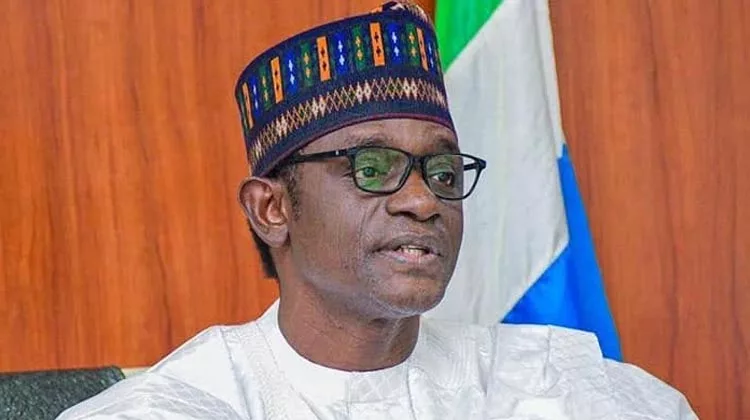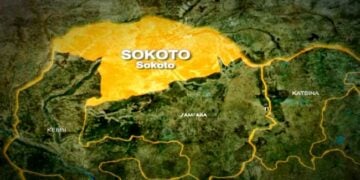For years, Adamu Buba, a farmer from Jajere village, faced daily struggles that many in rural Yobe can relate to. Like most in his community, his life was deeply intertwined with agriculture, yet getting his produce to market was an exhausting and often fruitless effort. The journey from his home to the nearest market involved navigating rough, unpaved paths, which in the rainy season would transform into impassable swamps.
Buba, a father of six, shared that the people in his area had endured harsh living conditions due to the poor state of road infrastructure for years. This difficult situation persisted until the administration of Governor Mai Mala Buni stepped in, announcing the commencement of the ‘Rescue Efforts for the Danchuwa-Jajere 32km Road Project’. This initiative has brought hope to the residents, offering a much-needed solution to their longstanding challenges.
“We used to carry our produce on our bicycles, motorcycles, tricycles (Jega), cow carts, heads and backs,” Adamu recalled with a touch of frustration in his voice.
“Many times, perishable items got spoiled easily before they reached the market.”
These were difficult years for Adamu and his neighbors. With a market so far away and no reliable transportation options, the villagers often had to resort to traditional methods, which meant that their valuable harvests, sometimes the result of months of hard work, would be lost before they could be sold.
But in 2025, that all began to change. The completion of the Danchuwa-Jajere road project, a 32-kilometer stretch of paved road that links Jajere to nearby urban centers, has transformed the daily life of Adamu and his fellow villagers. Now, with a solid, reliable road leading to the market, the logistics of getting crops to customers has dramatically improved.
“I can now reach the markets in Potiskum, Damagum among others in less than 30 minutes. This road is not just for transport, its life, its food, money, and hope.” Adamu said, his face lighting up with pride.
Today, Adamu’s tale has changed.
The transformation in Jajere is one of many testimonies echoing through Yobe State, where Governor Mai Mala Buni’s commitment to urban and rural infrastructure especially road construction becomes a symbol of progress and inclusion.
Since assuming office, Governor Buni has made road infrastructure a cornerstone of his development agenda.
His administration has prioritized connecting remote communities, linking towns to urban centers, and revitalizing intra-city roads with drains in places like Damaturu, Potiskum, Gashu’a, Geidam, Buni-Yadi and Nguru. But in 2025, the pace and scale of projects hit a historic high.

The Yobe State Commissioner of Works, Engr. Umar Wakil said, “This year alone, we awarded several new road contracts from feeder roads in rural areas to dual-carriage highways in the cities. Governor Buni sees roads as the spine of economic growth and social inclusion.”
In Bade Local Government mostly riverine, muddy and dusty hamlets which face challenges and even cut off from the rest of the region especially during the rainy season, now hums with newfound energy.
Hassan Bulau, a resident of Gashu’a, grew up watching vehicles avoiding communities around Tagali and Masaba areas due to the difficult Torrent creating hardship to locals who depend on farming as a source of livelihood.
“During the rainy season, our area turned into a swamp. No vehicle could pass,” he said.
“Ambulances would stop three kilometers away, and we carried patients the rest of the way.”
In March 2025, the Chumbusko–Tagali and Gashu’a-Masaba roads were completed and since then, Hassan’s mode of living and that of his family has improved while businesses such as mechanics among others have expanded their roadside workshop due to increase in traffic and economic activities.
“Traffic has increased. Many items that were hitherto only accessible in places like Gashu’a town are now available as they are easily transported to nooks and crannies of Bade local government areas due to the completion of several roads across the area,” Hassan disclosed.
So far, the Buni administration has started and completed 2km road and 4km drainage at Bakin Kasuwa Gashu’a as well as 2km road and 4km drainage at Gashu’a Motor Park to Alheri Super market.
In the ancient town of Nguru, change is also unfolding. Long known for its historic role in trans-Saharan trade, rural areas linked to Nguru and the town itself had faced declining fortunes due to difficult torrent and limited roads.
Bulama Modu, a local teacher, remembers when the main access road to Nguru looked like a relic of war due to desert with sand dunes and in some areas erosion necessitated by the Nguru wetland.
“Potholes, dust, and constant breakdowns, visitors avoided us,” Modu revealed. That also began to change due to the construction of the 3.3km township road and 6.6km drains at FMC to Flin Idi in Nguru as well as construction of roads such as 16km Nguru-Balanguwa, Balanguwa-Kumaganam among others.
“Now students that resume to schools late use to arrive on time. Teachers posted to our areas don’t reject or leave anymore. The town and the villages surrounding it feels alive again,” Bulama said with pride.
Potiskum, the commercial nerve center of Yobe, has also benefited fromthe governor’s road revolution. Mohammed Musa, a livestock trader inthe bustling Potiskum cattle market, said the difference is night andday.
“We used to spend hours stuck in traffic, especially during market days. Drivers cursed, traders cried. Accidents were frequent,” he said. But the newly completed road and drains from around Kwanan Danja to Bayan Tike, 2.6km, Yankaji as well as Adamu Jajere one way and that of T-Junction road and drainages, Talakawa, Nitel to CAMTECH awarded and completed by the Buni administration has not only ease movement but changed the game.
“Trucks move freely now and goods come in faster. Even buyers from different parts of the state and even beyond are returning hence business is moving smoothly,” Musa said.
At the southern part of Yobe, places like Fika Local Government, the rural farming community of Maluri once endured logistical nightmares during harvest. Fatsuma Abubakar, a groundnut farmer and mother of five, remembered struggles to get her produce to the Fika town.
“My children missed school during harvest season because they helped me carry baskets. The bush path was our only option,” she said.
The 22.5km Fika-Maluri pursuit by the people of the area for over 30 years was equally one of the road governor’s rural roads initiative.
“We now hire every kind of vehicle including tricycle that takes us to market and back. I even started a small business selling palm oil. I never thought I’d be this free.”
Government has equally awarded projects for the construction of township road project in Fika just as it was done in LGAs such as Jajimaji, Babbangida, Damagum among other local government headquarters.
Damaturu, the Yobe State capital, is undergoing a significant urban facelift, marked by the expansion of wide streets and the launch of key infrastructure projects. At the heart of this transformation is the award of the construction of a flyover and an underpass bridge, valued at N22.3 billion.
According to the Yobe State Commissioner for Works, Engr. Umar Wakil, the project is scheduled for completion within 18 months and is aimed at addressing the growing traffic congestion in the city.
He explained that the initiative is part of governor Buni’s long-term plan to improve mobility, enhance safety, and support the state’s vision for a modern and efficient capital city.
Modu Musa, a tricycle operator who has lived in Damaturu all his life, said the transformation is not just graphic but physically done through construction of various roads and drainages.
“It was fascinating that Governor Mai Mala Buni was able to consolidate on the road project initiatives started by his predecessor by extending it to many places making our job easier and rewarding.
“Many road projects started and completed by the governor have opened up more opportunities and improved movement within the city and with the current award of the Damaturu flyover and the underpass project, the urban modernization policy of the present administration is not only real but encouraging.
“This governor thinks ahead,” Modu added. “He builds for tomorrow, not only just today.”
While roads are the most visible sign of progress, their ripple effects are vast. “Where a road goes, development follows,” said Hajiya Salma Yakubu, a concerned Yobe citizen. “Girls can go to school safely, pregnant women can reach hospitals, and farmers can access fertilizer and market.”
She praised the Buni administration for including roads in 2025 adding that the project will benefit more women economically. To ensure quality, Governor Buni has apart from periodic unscheduled visits to project sites, instituted a rigorous monitoring mechanism including the one led by the State Secretary to the State Government, Alhaji Baba Mallam Wali and accompanied by the Commissioner of Works and other experts for better results. As bulldozers rumble and fresh asphalt stretches across plains, residents see more than construction. They see dignity, connection, and belief in the future.
Back in Jajere, Adamu Buba takes a break from his farm to watch children race bicycles along the new road. “I’m 53 years old. I’ve never seen this kind of change,” he says softly. “Tell the governor we thank him. Not just for the road, but for remembering us.”
In Yobe State, roads have become more than routes. They are symbols of a leader’s promise and a people’s progress.
– Yawale is the HoD Information Services, Yobe State Ministry of Home Affairs, Information and Culture.





